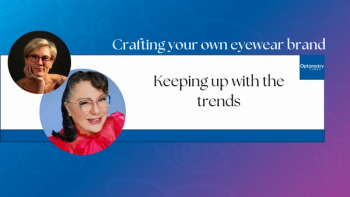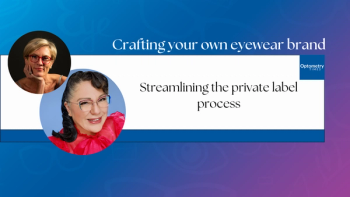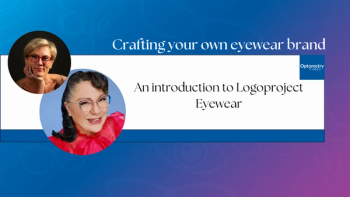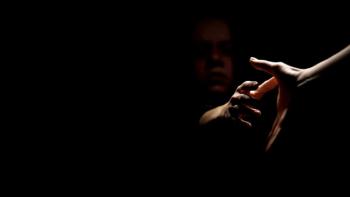
Optometrists’ role in curbing the spread of COVID-19
Gretchyn Bailey, NCLC, FAAO: Hi everybody. I am Gretchyn Bailey. I am editor in chief of Optometry Times®, and I am joined today by Ben Casella who is our chief optometric editor. Hi, Ben, how are you?
Benjamin Casella, OD, FAAO: Very good. How are you?
Bailey: We are hanging in here. It is a little windy where I am today. So, you might hear our wind chimes going, and I hope that our internet stays up to date. But we are hanging in there, and I wanted to talk to you a bit about how you are handling being mostly shut down and your practice and what is going on for you.
So, tell me a little bit about how your practice has evolved, what you are doing currently, and how things are going.
Casella: I would be happy to do that. Currently, I am sitting at home. Around St. Patrick's Day, when the guidelines came out, we immediately postponed all of our routine patients until about the middle of April at that point, and now we are moving them all into about the middle of May. I don't know, it may be that we need to move them again. But it was just kind of like we sat there for a couple of minutes. And then it was just time to get things rolling.
That was a few weeks ago at this point, just around 3 weeks. And at first, you know, all of us small business owners out there, I was having thoughts and prayers for this all just to end as quickly and as safely as it could, but also having existential thoughts about the future of my business, of my practice, of my livelihood.
With the passage of the $2 trillion spending bill, $350 billion of that for small businesses, that has been, certainly a ray of hope. I am told by my bank that I am looking good. I will believe that when I see the money. I have not laid off or furloughed any of my staff. I should say I am defined as a small business. I have 5 employees, not including myself, so I don’t have a huge payroll. So, I am able to keep a little bit on ice. I have not had to furlough anybody yet and not planning on it.
We are open a few days a week for a few hours a day, which is what most ODs are doing. We are there for emergency care, and we are there only for emergency care. I saw a patient who we thought was having a retinal tear a few days ago, took a foreign body out of a cornea last week. And that has really been about it. Every other thing I have been able to diagnose over the phone, or with a picture texted to me. So, we have gone from seeing about 150 patients a week to seeing 1 or 2.
And we are all in the same situation. And we are just trying to do our part to make sure that our patients stay safe, make sure that we stay safe, our families stay safe. And we are really just taking it like a half a day at a time because that seems to be how quickly this is changing.
Bailey: So, let’s back up for a minute. You said that you are open for a few hours at a time. So does that mean that you are going into the practice and you have staff there? What does that look like for those few hours a day that you are, let’s say, open?
Casella: So, that is an excellent question. We are there. We are answering the phone, we are taking contact lens orders. I want to say a big shout out to our contact lens manufacturers and distributors. A lot of them have waived mailing costs, and that is great.
Our front door is locked. If you are having an eye emergency, there is a sign on the door. You can call us; you can knock on the door. And if you have something that I need to address, I will take you back, myself. And I have got 2 staff members with me there. I am answering phones and just trying to get patients rescheduled. We were booked out about 6 weeks before this happened. So, we are still calling people. They are on either side of the office.
And then on the days that we are there we are there until noon, and then we close up when we leave. I have one employee that has a young child, and she is a single mother, and she doesn't have any childcare. And so, they come in. She comes in a few days a week for a couple hours in the afternoon, when nobody else is there. And I have got everything wiped down where her child can hang out. And she continues to just answer the phone and try to get all these patients rescheduled. And that is pretty much where we are at.
Bailey: Well, that is great that you are still working with that employee who has got a small child. And I bet you, she really appreciates that so she can continue to work as well as care for her child. And you are also staggering your times with you and the other 2 employees there in the morning and her in the afternoon.
But let's sit back and talk about your patients that you have rescheduled to May. So, we are looking at just about mid-April right now. And a lot of things are shut down to April 30. And at what point do you decide that you need to push back those patients that you are starting to schedule for May?
Casella: I'll probably decide that. My internal clock is saying that 3 or 4 days from now, I am going to make that call. And I am thinking more and more likely than not, I am going to have to make that call. But thank you for your kind words about how I am trying to work with my staff here. Now is not the time to be mean, Charlie Brown.
Bailey: That is true. And you said that you have not laid off or furloughed anybody. So, what does that mean, that you are paying them full as you go through, so they are not applying for unemployment?
Casella: Right now I am paying them full. And I just want to stress I have a very small staff. And I am fortunate that I don’t have a lot of payroll overhead. I know that I am very different than a lot of doctors out there. But I am doing that for the time being. and I am hoping to hear in a few days that the small business loan will go through, and I will be able to keep on paying them.
Bailey: Well, that is great that you are able to do that. And I know that it has been a bit of an onerous process going through all of that paperwork and the application process. And so, hearing in a few days is actually pretty fast. When do you anticipate that you will see the cash?
Casella: Well, we got an email this afternoon from the American Optometric Association (AOA) saying that some doctors were starting to see their small business loans trickle in. Augusta is like a really big neighborhood, and I am fortunate to have a good relationship with the folks at the bank, and I don’t think that they would feed me a line. They say they are optimistic, and so I am hoping, maybe realistically hoping, end of next week, beginning of the week after.
I will say that it is incredible to have to do so much just to prove that you are a business with a payroll, and I totally get it. And anybody who is trying to use any portion. If they are trying to use $1 of this $350 billion for any ulterior motive other than the spirit of the bill, the spirit of the law, I hope they get audited. But I was asked for various aspects of my corporate taxes, and finally I just said, you know what, I am just going to sit next to the scanner for about an hour and I am just going to scan you all of 2019. So, I did, and I scanned in my quarterly tax payments. I scanned in what I paid in health insurance, what I paid towards retirement because that all counts. Really, that all goes into the loan. It is not just your payroll. And your utilities should be itemized on your corporate tax return.
And I honestly never flipped that far back into it. And so that all that all counts, as well. And if you use the loan over the 8 weeks, I believe it is 8 weeks that you have it for payroll, utilities, rent, health insurance premiums, and then it seems as though it is essentially a grant and they are anticipating that the payroll should be no less than 75 percent of what you use it toward. And they are anticipating that just because they are anticipating just a high volume of people taking advantage of this.
But I am optimistic about it. It is just, these are just unprecedented times, and I have been very careful. When I say that I have had existential thoughts about the future of my business, I am not complaining, I am just being honest because I think a lot of us have. And I am very quick not to complain because it could be a lot worse than it is.
Bailey: That is true. That is absolutely true. How are you staying in touch with your patients? Because I know people are saying that communication with everyone is important: communication with your staff, and communication with your patients so that they will be there for you when you get back. Can you talk a bit about how you are addressing that in your practice, what you have done, how they are responding, how is that working out?
Casella: So, that is a great question. Social media has been somewhat helpful. I have got it set up to where when I post something on Twitter or Facebook, it automatically goes to the other social media channel as well. And so I am tweeting my hours. I am tweeting reminders, like if you need contacts, we will be happy to extend your contact lens prescription a couple of months.
Bailey: I think we froze there.
Casella: Am I back?
Bailey: Yep, you are back.
Casella: OK. So, if you call us after hours, you will be routed. If you have a true eye urgency or a true eye emergency, then you are routed to a phone number. And you call that phone number, and my left pocket starts vibrating.
I feel as though, you know, we are not per se on the front lines of COVID-19, but we have a very important role to play. And the importance of our role has to do with keeping red eyes out of the emergency room. I cannot tell you how many patients I get that they had a red eye. It could have been—it is not like over the weekend or in the middle of the night, it was at 4:00 on a Tuesday when I am open. And they may be an established patient of mine, but they had a red eye. And they immediately went to the ER, and they were given gentamicin and told to follow up with me in a couple of days. I can’t tell you how many times that happened.
So, I feel really strongly that doctors of optometry, we need to be and I hear that we are doing our part, to keep red eyes out of the emergency room and do our part to help curb the spread of this thing.
Bailey: Totally agree. For our OD readers and viewers out there: What piece of advice do you have for them that you are finding is working for you, whether it is making sure you keep your sanity personally with your family because everybody is spending a lot more time together? Or it could be managing your staff or addressing your patients? What are you finding is working for you that you would offer as advice?
Casella: Again, now is not the time to be mean, Charlie Brown. As far as on the homefront, I can’t sit here and try to downplay it. I am blessed with a really good family. And I know that, and I appreciate that and the rock of the family is my bride. So lean on your loved ones and know that when it is time, you need to be there when they need to lean on you. You are absolutely not alone.
And please minimize your exposure to network news. Because most of what is being said, at least in my experience on network news, and this is not a right versus left thing, this seems to be a network news thing. I am not hearing a lot of fact.
Bailey: I know it is very easy to go down the rabbit hole of news, and I have been doing that myself. Usually, throughout the day I keep the CNN live updates up on weekends.
Casella: Well, we can't help it.
Bailey: Yeah, I mean, I want to know what is going on, but it is also not good for your mental state, and it ends up being just such a time suck. And I know for me personally, I am having a hard time focusing on one task, staying on the straight and narrow to get things done, and I am betting a lot of people are feeling that just with the ongoing anxiety.
Casella: I think that meditation can play a key role in sort of staying in the moment and just sort of being present in the moment. And you don’t have to be at home, alone in a dark room with the lights off and a candle lit to do it. You can grab a second or two on the go, just to sit and however you meditate. If you have a moment of silence, if you pray, whatever your M.O. is. I think it is just important to find ways just to be present in the moment.
And I am also blessed with a sense of perspective. My sister's husband, Dawn Don is a pulmonary critical care doctor who works in an intensive care unit (ICU), a few blocks down from my office. And he defines the front lines of this, and he was supposed to have a little bit of time off, and that is not happening. He has volunteered to go in and to work as hard as he can. And he is the one who is intubating people when they get critically ill and knowing that he is out there, taking one for the rest of us, it really makes me feel like I I just need to be present. I need to get through this. I need to get my family through this. I need to get my checking account through this. I need to get my staff through this. I need to get my patients through this, and this will come to an end. And whatever the news is, we will all get through this.
Bailey: Right.
Casella: I think you might have frozen for a second.
Bailey: Yeah, I think we did freeze for a second. Well, Ben, this was really great. Thank you so much for talking with me today and for sharing all of this, and I am sure we will be talking again soon. Thanks so much, Ben.
Casella: Talk soon.
Bailey: All righty. Bye.
Casella: Bye.
Newsletter
Want more insights like this? Subscribe to Optometry Times and get clinical pearls and practice tips delivered straight to your inbox.









































